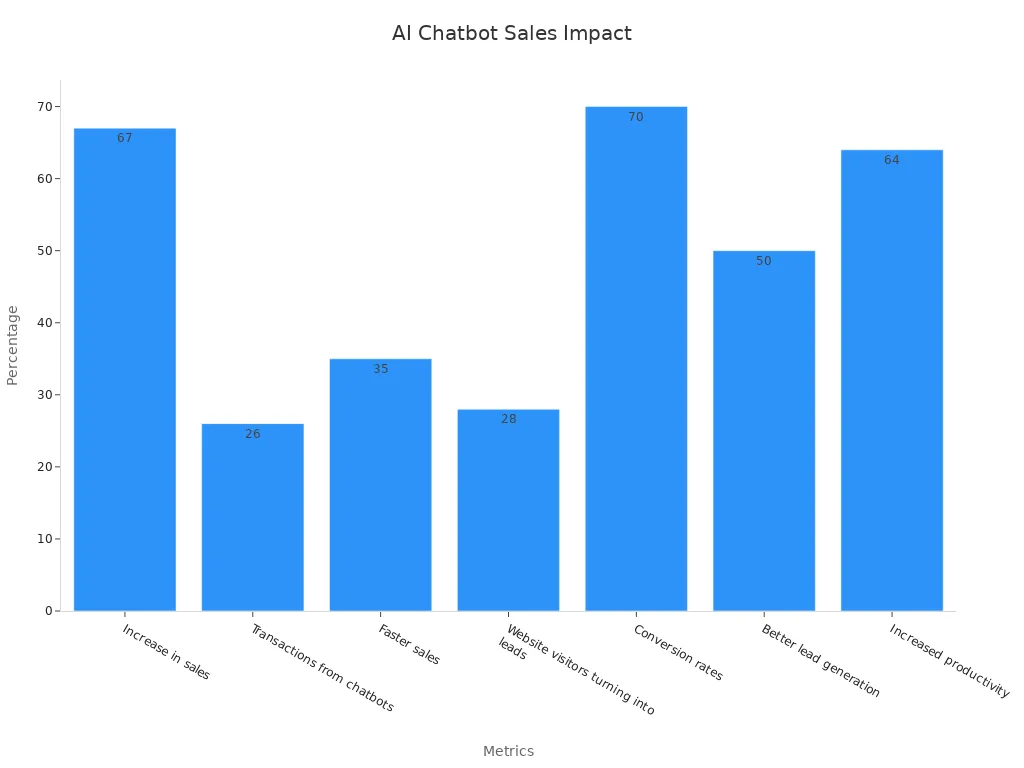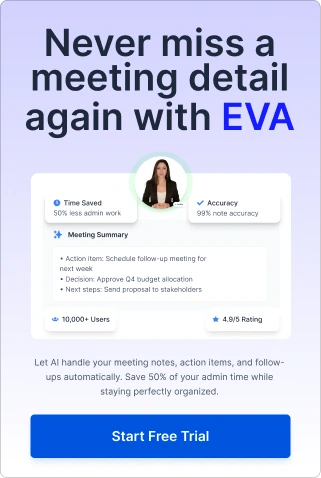Table of Contents
Introduction
In an era defined by digital transformation and fierce market competition, businesses are relentlessly searching for innovative strategies to not only survive but thrive. The quest for enhanced customer engagement, streamlined operations, and, most critically, increased sales, has led many to embrace the transformative power of Artificial Intelligence (AI). Among the most impactful AI applications to emerge in recent years are AI chatbots.
Far from being mere automated response systems, modern AI chatbots are sophisticated tools capable of fundamentally reshaping how companies interact with their clientele, manage their sales pipelines, and ultimately, achieve remarkable revenue growth.
This comprehensive article delves deep into the multifaceted ways AI chatbots are becoming indispensable assets in the sales ecosystem, providing concrete examples, compelling statistics, and a special spotlight on leading solutions like Paradiso AI.
Paradiso AI: Pioneering the Future of Sales Engagement

At the forefront of AI innovation in sales, Paradiso AI stands out as a comprehensive platform offering a diverse array of AI-powered tools meticulously designed to optimize every facet of business operations, with a particular emphasis on accelerating sales cycles and enhancing customer interactions.
Their flagship offering, the AI Assistant Builder, empowers businesses to craft bespoke AI agents tailored to their unique sales processes. These intelligent agents are capable of automating a wide spectrum of tasks, from initial customer outreach to post-sale follow-ups, thereby significantly streamlining workflows and freeing up valuable human resources.
Consider the daily challenges faced by sales teams: managing numerous leads, scheduling meetings, summarizing lengthy discussions, and ensuring timely follow-ups.
Paradiso AI directly addresses these pain points. For instance, their innovative AI meeting assistant, Eva Paradiso, is engineered to meticulously automate meeting summaries, extract key action items, and seamlessly integrate with popular collaboration platforms such as Microsoft Teams. This capability alone translates into substantial time savings for sales professionals, allowing them to dedicate more energy to strategic selling and relationship building rather than administrative overhead.
Beyond internal team efficiency, Paradiso AI’s impact extends directly to the customer-facing aspects of sales. The platform explicitly highlights its ability to dramatically boost lead generation, optimize e-commerce sales funnels, and refine outbound sales strategies. This is achieved through intelligent conversational interfaces that can engage potential customers, answer their queries with unparalleled accuracy, and guide them through the sales journey. By ensuring that customer interactions are not only efficient but also highly informative and trustworthy, Paradiso AI chatbots revolutionize customer engagement—a universally acknowledged critical factor in converting prospects into loyal customers and driving sustainable sales growth.
The Engine of Growth: AI Chatbots and the Transformation of Lead Generation and Qualification
One of the most profound contributions of AI chatbots to sales growth lies in their unparalleled ability to revolutionize the entire lead generation and qualification process. Traditionally, these stages have been resource-intensive, often requiring significant human effort to sift through prospects, engage them, and determine their sales readiness. AI chatbots, however, introduce a paradigm shift, automating and optimizing these critical initial interactions.
24/7 Engagement and Instant Response
Unlike human sales representatives, chatbots operate tirelessly, 24 hours a day, 7 days a week. This constant availability means that no potential lead is ever missed, regardless of time zones or business hours.
When a prospective customer lands on a website, a chatbot can immediately engage them, answer their initial questions, and capture vital information. This instant response capability is crucial in today’s fast-paced digital environment, where customer patience is often limited.
By providing immediate assistance, chatbots prevent potential customers from abandoning their journey due to delays or unanswered queries.
Intelligent Information Gathering and Pre-qualification
Chatbots are programmed to ask targeted questions, guiding visitors through a conversational flow designed to gather essential data. This can include contact information, specific product interests, budget considerations, and timeline for purchase.
Based on the responses, the chatbot can then pre-qualify leads against predefined criteria. This intelligent pre-screening ensures that only genuinely interested and viable prospects are passed on to the human sales team. This significantly reduces the time and effort sales representatives would otherwise spend on nurturing unqualified leads, allowing them to focus on high-value interactions and closing deals.
Quantifiable Impact on Sales
The impact of chatbots on sales figures is not merely anecdotal; it is supported by compelling statistics. For instance, a report by Intercom indicates that businesses leveraging chatbots for sales purposes have witnessed an impressive average sales increase of 67%. A substantial portion of this growth can be directly attributed to the enhanced efficiency and effectiveness of lead generation facilitated by these AI tools.
By automating the initial stages of the sales funnel—from asking qualifying questions to gathering contact details and even scheduling appointments—chatbots empower sales teams to operate with unprecedented efficiency.
Streamlined Sales Funnel and Resource Optimization
The automation of lead qualification by AI chatbots frees up human sales representatives from repetitive, time-consuming tasks. This allows them to dedicate their expertise to more complex aspects of the sales process, such as building relationships, negotiating deals, and providing personalized solutions. The result is a more streamlined sales funnel, where leads are efficiently moved from initial engagement to conversion. AI chatbots excel at analyzing user responses in real-time, dynamically assessing the likelihood of a visitor converting into a customer. This intelligent assessment enables businesses to prioritize leads effectively and allocate their sales resources more strategically.
Beyond the Sale: Enhanced Customer Service and Support as a Sales Driver
While the direct impact of AI chatbots on lead generation and qualification is undeniable, their role in enhancing customer service and support is equally, if not more, critical to long-term sales success. Exceptional customer service is no longer just a differentiator; it is a fundamental expectation that directly influences purchasing decisions and fosters brand loyalty. AI chatbots are instrumental in elevating this aspect of the customer journey.
24/7 Instant Assistance and Reduced Response Times
One of the most significant advantages of AI chatbots in customer service is their ability to provide instant, round-the-clock assistance. In an always-on world, customers expect immediate answers to their questions. Chatbots can handle a vast array of common inquiries, from product specifications and pricing to shipping information and return policies, without any delay.
This 24/7 availability is crucial for preventing potential customers from abandoning their purchase journey due to frustration over unanswered questions or slow response times.
By resolving queries promptly, chatbots significantly improve customer satisfaction, a key precursor to sales.
Consistency, Accuracy, and Efficiency
AI chatbots are programmed to deliver consistent and accurate information every single time. Unlike human agents who might have varying levels of knowledge or be prone to human error, chatbots ensure a standardized and reliable customer experience.
This consistency builds trust and confidence in the brand. Furthermore, chatbots can handle a massive volume of simultaneous interactions, dramatically improving operational efficiency. This allows human customer service representatives to focus on more complex, nuanced issues that require empathy, problem-solving skills, and human intervention, thereby optimizing the allocation of valuable human resources.
Fostering Trust and Encouraging Repeat Business
The ability of chatbots to resolve common queries quickly and efficiently leads to a smoother, more positive customer experience. This positive interaction, even if automated, contributes significantly to fostering trust between the customer and the brand. When customers feel supported and their needs are met promptly, they are more likely to make a purchase, return for future purchases, and even recommend the brand to others. Research consistently demonstrates that AI chatbots are actively helping businesses to not only retain customers but also to boost their overall sales.
A superior customer service experience, often seamlessly facilitated by AI chatbots, directly influences purchasing decisions and cultivates enduring brand loyalty, which in turn fuels sustainable, long-term sales growth.
The Power of Personalization: Tailoring Experiences and Unlocking Upselling Opportunities
In an increasingly crowded marketplace, generic interactions fall flat. Customers today expect personalized experiences that acknowledge their unique needs and preferences. AI chatbots are not merely automation tools; they are sophisticated engines for delivering highly personalized customer journeys, which in turn, unlock significant upselling and cross-selling opportunities.
Data-Driven Personalization
The true intelligence of AI chatbots lies in their ability to analyze vast amounts of customer data and interaction history in real-time. This data includes past purchases, browsing behavior, previous inquiries, and stated preferences. Armed with this information, chatbots can dynamically tailor their responses, recommendations, and even conversational tone to individual customers. This level of personalization creates a feeling of being understood and valued, significantly enhancing the customer experience and increasing the likelihood of conversion.
Strategic Upselling and Cross-selling
The personalized interaction facilitated by AI chatbots creates fertile ground for strategic upselling and cross-selling. As chatbots guide customers through their journey—whether it’s browsing products, seeking information, or resolving an issue—they can intelligently suggest relevant products or services. This is done based on the customer’s current context, expressed needs, or historical data. For example, if a customer is inquiring about a specific smartphone, the chatbot can proactively recommend compatible accessories (cross-selling) or suggest a higher-tier model with advanced features (upselling). This proactive, yet non-intrusive, approach to sales is far more effective than generic promotions.
Conclusion: The Indispensable Role of AI Chatbots in Modern Sales
In conclusion, the question is no longer whether an AI chatbot can help increase sales, but rather how quickly businesses can integrate these transformative tools to gain a competitive edge. AI chatbots have evolved from simple automated responders to sophisticated, intelligent agents capable of profoundly impacting every stage of the sales funnel.
Their ability to provide 24/7 engagement, streamline lead generation and qualification, deliver unparalleled customer service, and facilitate highly personalized experiences—complete with strategic upselling and cross-selling opportunities—makes them an indispensable asset in the modern sales landscape.
Solutions like Paradiso AI exemplify the cutting-edge capabilities available today, demonstrating how advanced AI can be leveraged to not only optimize sales processes and enhance customer engagement but also to drive significant, measurable revenue growth. As the digital ecosystem continues to evolve, the role of AI chatbots will only become more critical.
Businesses that embrace this technology will be better positioned to meet customer expectations, improve operational efficiency, and ultimately, achieve unprecedented levels of sales success. The future of sales is conversational, intelligent, and powered by AI.
FAQ: How AI Chatbots Unlock New Revenue Streams for Marketing Agencies
An AI chatbot is a virtual assistant on a website that automatically engages visitors, answers questions, qualifies leads, and assists with booking meetings. For marketing agencies, it helps automate client interactions and supports 24/7 customer engagement.
AI chatbots can increase revenue by automating tasks such as lead qualification, customer support, and personalized interactions. They help agencies save time, improve client engagement, and create new services, like chatbot management and data-driven marketing.
Yes, AI chatbots can qualify leads by asking targeted questions, gathering information, and scoring leads based on their responses. This ensures that only high-quality leads are passed on to the sales team, improving efficiency and increasing conversion rates.
AI chatbots are available round the clock, meaning they can engage with visitors and answer questions even when the marketing agency’s team is offline. This ensures no lead is missed, and clients always have access to support.
Yes, marketing agencies can offer AI chatbot services to clients, including chatbot setup, integration, and ongoing management. This opens up new revenue streams by providing clients with automated customer support, lead qualification, and more.
AI chatbots personalize interactions by using data to understand visitors' behaviors and interests. The chatbot can provide tailored recommendations, suggest related services, or offer targeted content based on what the visitor is looking for, leading to higher engagement and conversions.
AI chatbots collect data about visitors’ behaviors, preferences, and questions. This information can help marketing agencies create better marketing campaigns, personalize strategies, and provide clients with valuable insights about their target audience.
Yes, AI chatbots can help upsell or cross-sell services by analyzing user interactions and suggesting relevant services. For example, if a visitor shows interest in one service, the chatbot can recommend complementary services, increasing the chances of higher-value sales.
 Free
Free







